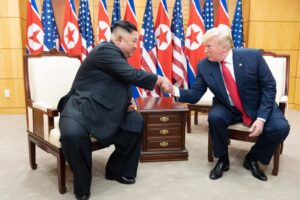Secretary of State Antony Blinken’s recent article in Foreign Affairs, America’s Strategy of Renewal, seeks to robustly defend the Biden administration’s foreign and domestic policies with a heavy emphasis on national security.
Instead, it is a self-incriminating summation of why this administration’s national security policies have such a high failure rate: they are built on sand instead of the solid silicon of semiconductors. The next administration must do dramatically better in understanding both the semiconductor industry and its fundamental role in the modern world with robust national security policies reflecting this understanding.
Regardless of who wins the upcoming presidential election, the next administration’s citadel of national security policies will likely fail without a solid silicon foundation.
A failure of understanding
Blinken’s article describes a blinkered national security Weltanschauung with semiconductors having a vague, undifferentiated importance and only a superficial understanding of the semiconductor industry. He has never grasped that semiconductors are the foundation of all modern civilian and military technologies and thus are nonpareil.
As a result, Blinken never developed a semiconductor strategy to serve as a solid foundation for his administration’s national security policies. The semiconductor supply chain is globally distributed, intensely and complexly interconnected, and it has critical semiconductor businesses, such as Netherlands-based ASML and Taiwan-based TSMC, headquartered outside of the U.S. Close cooperation with key allies that are semiconductor heavyweights is consequently indispensable for any successful U.S national security semiconductor strategy.
Such a semiconductor strategy would, at a minimum, have the United States leading the charge in establishing a semiconductor export control treaty among Germany, Japan, the Netherlands, South Korea and Taiwan. All are key semiconductor heavyweight allies. The treaty would focus on prohibiting the banned semiconductor products from being sold to China, Russia, North Korea and Iran. Effective enforcement would be equally crucial so it would not simply be a paper tiger like the failed Wassenaar Arrangement, which is the global, voluntary export control regime governing semiconductors with Russia as its notorious, obstructionist member.
The complete omission of any reference to the collapse of the Wassenaar Arrangement in Blinken’s article makes plain its superficial understanding of the semiconductor industry.
Self-defeating, failed tactics
Without a semiconductor national security strategy, the Biden administration has only self-defeating, failed semiconductor national security tactics.
In his article, Blinken praised the passage of the CHIPS Act and detailed the follow-on foreign investment from all five of the world’s top semiconductor manufacturers to build new plants in the U.S. He also noted that the U.S. has provided $94 billion to support Ukraine since Russia re-invaded it in February 2022.
He did not, however, connect the dots.
The investigations subcommittee of the U.S. Senate Homeland Security and Governmental Affairs Committee released a shocking report in September, finding that Intel was the top producer of battlefield goods imported to Russia from January to October 2023.
Intel has been awarded $8.5 billion in direct grants from the Commerce Department’s CHIPS and Science Act along with an additional $3.5 billion from the same funding source to subsidize Intel’s creation of a classified advanced semiconductor manufacturing facility.
Funding both sides of the Ukrainian war with billions in U.S. taxpayer dollars is the epitome of self-defeating semiconductor national security tactics.
If the Biden administration had prioritized semiconductor export controls appropriately, they would have determined within two weeks — not over two years — that Intel’s chips were illicitly being acquired by Russia in volume to use in its weapons against Ukraine and ensured Intel thoroughly investigated “red flag” spikes in sales to suspected transshipment countries.
The Biden administration also would have demanded prohibitions on export control violators from receiving CHIPS Act grants and tax credits. Surprisingly, there are no such guardrails.
The Biden administration’s failed tactics are airbrushed away when Blinken inaccurately claims in his article that the U.S. urged Japan and the Netherlands to join the U.S. in adopting measures to prevent China from gaining access to the most advanced semiconductors and the equipment used to produce them.
In reality, the U.S. has for two years badgered these two countries to adopt the U.S.’s unilateral, stringent semiconductor export control rules implemented in 2022. That Lone Ranger tactic completely backfired because Japan and the Netherlands subsequently adopted only token semiconductor export controls and then proceeded to steal significant market share in China from the U.S. semiconductor equipment manufacturers who were bound by the much more restrictive U.S. export controls.
Incensed about the billions of dollars in lost sales to the U.S. semiconductor businesses, the Biden administration went from badgering to bludgeoning. It threatened to commandeer the foreign policy of Japan and the Netherlands by invoking an extraterritorial export control rule known as a foreign direct product rule.
Businesses in Japan and the Netherlands would be required to first obtain an export control license from the U.S. before certain advanced semiconductor products from these countries could be sold to China. Even this hyper aggressive tactic has failed. If the Biden administration had understood the nonpareil nature of semiconductors, it would instead have been willing to trade whatever it took to get an agreement with effective enforcement.
The next administration must act
Regardless of who wins in the upcoming presidential election, the stubborn objective reality of today’s Silicon Age means the next administration must both understand the semiconductor industry and its pivotal, fundamental role in all aspects of national security policies.
Even though Harris and Trump have decidedly different approaches to national security, the next administration’s policies must nevertheless be built on a solid silicon foundation. If built on sand like the current administration, count on another crack-up.







